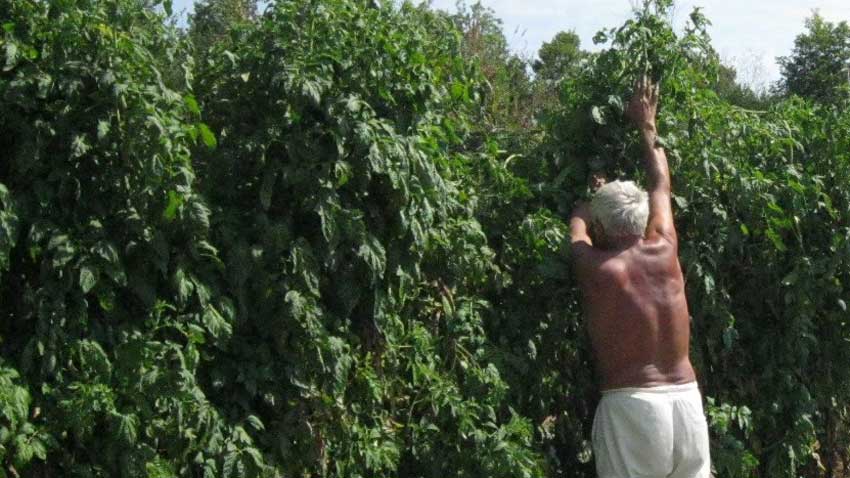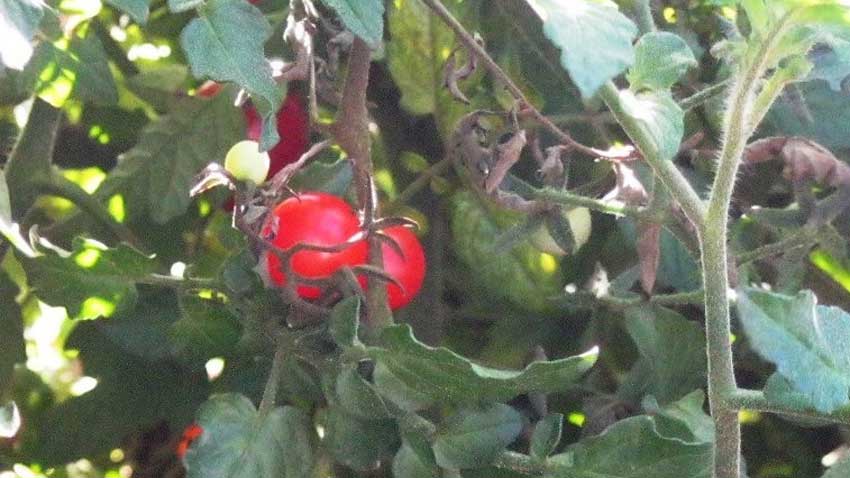“It all started with the sample – error principle,” sisters Svetlana and Darina Ivanov from the town of Gabrovo say about their farming adventure. One of them has a university degree in physics, the other – in public relations. When they inherited mountainous farmland, the sisters decided to cultivate it in a natural manner. They opted for the manure, produced by the so-called Californian worms.
“Their actual origin is from the delta of the Nile,” Svetlana explains. The worms procreate really fast and while eating manure they enrich it with substances, precious to plants. The organic humus produced keeps soil’s humidity longer and there is no risk of overdose, the way it is with unprocessed manure. One more important  feature – it does not contain weed seeds, typical for manure. The first results were really impressive – the tomatoes grown with this fertilizer were taller than an adult person!
feature – it does not contain weed seeds, typical for manure. The first results were really impressive – the tomatoes grown with this fertilizer were taller than an adult person!
“The plant itself grew quite higher, but it was healthier too, with a thicker stalk and a better root system,” the young lady points out. “The most amazing thing was that we could pick up tomatoes even in November – and our lands are in the mountain, where temperatures go really low. When we tasted the first tomatoes, we felt like we ate the ones of grandma in our childhood – it was a true pleasure.”
The young farmers discovered that the organic humus, produced by Californian worms contained enzymes which strengthened the resistance of plants – the dangerous Tuta absoluta moth species attacked this country a couple of years ago and it had the dangerous image of a total destroyer of plants.
“Our neighbor began to complain about throwing away whole buckets with tomatoes,” Svetlana says. “We started to observe our plants as well. We had only several roots damaged. He asked how we did it, what pesticides we used. We answered to him – none. The man obviously didn’t believe us. Later on he admitted that he had spied on our tomatoes while we were gone and he saw it with his own eyes. We gave him a solution of our organic fertilizer to spray the affected tomatoes and he was really happy afterwards…”
It turns out that the famous An Apple A Day Keeps The Doctor Away saying can be referred mostly to those fruits, grown in an organic manner, the Ivanov sisters say. The organic manure of Californian worms provides many more microelements to plants which are contained in vitamins at the same time. Precious minerals double in volume with tomatoes for example. Organic manure achieved 59% of magnesium versus barely 4.5% with fertilizers. The significance with iron is the most shocking one – we have 1.938 mg of it per 100 g of dry substance versus only 1 mg in the other case.

Young Gabrovo farmers are convinced that Bulgarian farming should be encouraged due to the excellent qualities of its fruits and vegetables.
“Whenever there is any Bulgarian production, it travels less and the fruits or vegetables can be picked in a more mature phase. This has its importance, regarding taste and health benefits. Then it wouldn’t allow the import of vermin from abroad. The Tuta absoluta moth species mentioned above is not typical for this latitude - it has been imported from southern lands. The bad thing about it is that the moth cannot be exterminated in a chemical way. It is a true disaster for Spain. Bulgarian fruits and vegetables are more expensive due to the lower subsidies and the manual labor used, but their quality is better. Farming can open job opportunities to many people, while all Bulgarians can have good food at the same time…”
English version: Zhivko Stanchev
Photos: private archiveThe Bulgarian minority in Romania marked a significant event with the official opening of the Bulgarian Inn in the village of Izvoarele (Hanul Bilgarilor), Teleorman County (Southern Romania)- a locality with Bulgarian roots dating back over 200 years...
The 14th edition of DiVino.Taste, Bulgaria’s leading forum for wines and winemakers, will take place from 28 to 30 November at the Inter Expo Centre in Sofia. Over 80 producers from all wine regions will participate, offering tastings of around 600 of the..
Minutes before the second and final reading, at the parliamentary budget and finance committee, of the state budget for 2026, the leader of the biggest party represented in parliament GERB Boyko Borissov halted the procedure and sent the draft bill..

+359 2 9336 661
